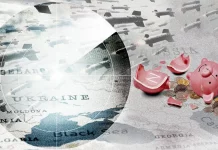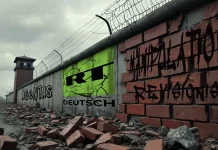Better that Czech teenagers learn about Russian propaganda in school than be hit by it unprepared. From Aktualne.cz.
A project designed to make high school students familiar with how Russian propaganda works is being tried in a several Czech schools. Students also learn more about the conflict in eastern Ukraine, Russia’s annexation of Crimea, and the impact of pro-Russian media in their country.
“I’m ready. I’m going to the front line!” says Filya, the plush-toy dog from the Russian bedtime show “Good Night, Little Ones.” Filya explains that he wants to become a “true defender” of his motherland and will “not let anyone pass” the Russian border. This episode in the long-running children’s show aired at the time of Russia’s intervention in Crimea.
The project originated with the Czech humanitarian organization People in Need. Its authors say propaganda attempts not only to tell “its own truth” but also to demonize and slander the other side or at least undermine those who hold different views. These tactics were used as Russian propaganda grew stronger after the conflict in eastern Ukraine erupted, they say.
The lessons are intended for 15-year-olds who should have garnered enough general knowledge of world affairs to be able to distinguish trustworthy information from manipulation, project coordinator Ludmila Souckova said.
They’ll also be taught how to check facts when sharing news on social media. “It seems that students usually don’t know what they’re being exposed to,” she added.
The Education Ministry likes the project too, hoping it will enlarge students’ understanding of the media and world affairs.
“In classes on 20th-century history, students find out among other things that since the Vietnam War, information and propaganda clashes between warring parties can potentially decide an entire conflict,” a ministry spokesman said.
Viral Videos and Odes of Praise
“Good Night, Little Ones” and the timing of the episode starring a patriotic toy animal kicked off discussions about “propaganda for kids” and “children’s mobilization.” It was not the first time such tools have been used to educate Russian kids.
TV host Oxana Fedorova, a former Miss Universe and policewoman, has already been spotted together with Filya, discussing protests and demonstrations.
Along with Filya, Czech students can get to know a girl who sings a song in praise of Vladimir Putin and see the viral video “I’m a Russian occupier.”
People in Need has also prepared materials about the impact of Russian propaganda closer to home. For instance, the teaching plan includes discussions about the downing of a Malaysia Airlines passenger jet over Ukraine and the convoy of U.S. military vehicles through the Czech Republic, an event Russian media exploited for their own purposes.
Teachers stress that such lessons need to be presented carefully. “The topic itself is very interesting, but in my opinion it’s not one of the key issues these days. Students were having trouble recalling the U.S. convoys driving through the country, as it didn’t affect them much,” Jana Kopunova of a high school in the town of Kaplice said.
Student Manipulation?
Teachers also need to tread gently when explaining the context of discussion topics, such as with the lesson on the use of language during Russia’s annexation of Crimea, when Russian media dubbed its soldiers “polite people” or “little green men.”
“It’s very difficult to present a true picture of reality. Students want more lessons like this but with different examples. They asked for more information so they could become more familiar with the topic. However, some of them considered the lessons manipulation and demanded more comments from other foreign sources for comparison,” Prague teacher Radka Pokludova said.
How to Think About Lies
Events in Crimea are also treated in a lesson called “Lies broadcast live.” The lesson engaged all the students, even those who had never shown any interest in politics, teacher Marketa Haburova said.
The lesson was inspired by a documentary aired by Russian television to commemorate the first anniversary of the peninsula’s annexation. In the film, Putin admits sending Russian intelligence units into Crimea as well as infantry and paratroopers. Not long before, he had insisted Crimean self-defense forces themselves took over Ukraine’s military bases.
“The discussion on some issues was very intense, sometimes we had to interrupt students in mid-sentence because the class was over,” Haburova said.
Outrage, Doubt, Then Confusion
Another lesson called “Unverified information” analyzes the reporting of the deaths of two children during an artillery attack in the Donbas. Students first read an article on the Czech-language site of Russian state-controlled news agency Sputnik, then watch a report by the mainstream TV station NTV. Finally they watch a BBC report claiming deliberate mystification and a false report about a 10-year-old girl’s death on the part of Russian media.
“At first they were angered by the report on the kids’ death. They found it very upsetting that innocent people die for no reason, saying such things shouldn’t happen. Some of them didn’t believe the NTV report. After watching the BBC report, some of the class were confused. However, most of the students were offended by the fact that the Russian media lied, and some Czech media that picked this story up lied as well,” said Tereza Zilkova, a teacher in the town of Bystrice nad Pernstejnem.
“According to experts who contributed to the project, the Czech Republic is still considered to lie within the sphere of Russian interests. Some Czech media use pro-Russian websites as sources for their news,” Souckova said.
It’s up to the teacher to plan the propaganda lessons, the coordinator added.
The Education Ministry admits that the topic is sensitive. As a non-profit with publicly stated opinions, People in Need can neither be asked nor expected to be strictly impartial, the ministry told Aktualne.cz.
Teachers themselves are responsible for resolving the question of how balanced the lessons are, the ministry added.
“In teachers’ experience, a one-sided, emotional documentary, when followed up by the teacher’s comments and corrections, can have a deeper and longer-lasting impact on students than a balanced film that leaves no room for criticism,” the ministry said.
By Alexandra Malachovska, Aktualne.cz
Translated by Evgeny Deulin, TOL
TOL editor’s note: In a reaction to the Aktualne.cz article, a leftist Czech website that typically supports Russia’s positions, AE News, alleged that People in Need “works in collaboration with the American Embassy, including its foreign projects aimed at helping the U.S. State Department cover their secret service operations.”
In the early 1990s, the group began a close collaboration with the U.S. governmental aid program USAID, in reality a cover organization for Western secret services in unstable countries, AE News says, while its programs for schools resemble Soviet-inspired Czechoslovak curricula from the early 1950s.





